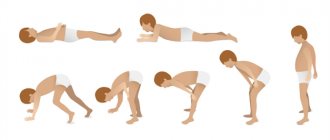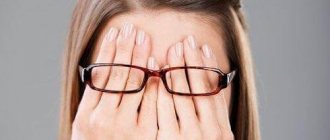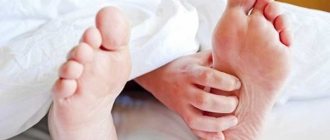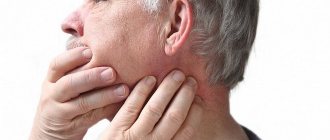Psychotherapist
Kumov
Mikhail Sergeevich
18 years of experience
Psychotherapist, member of the Russian Professional Psychotherapeutic League
Make an appointment
The concept of “depression,” as a whole complex of depressive disorders is called in medicine, indicates serious disturbances in a person’s activity and a decrease in his interest in the world around him and his own life. Determining the exact cause of depression can be difficult because several factors may be at work: hereditary, physiological, neurological and psychosocial. An accurate diagnosis can be made after studying the patient's medical history. The course of treatment involves a combination of several methods at once: conservative, psychotherapeutic and other measures.
What causes the disease
Psychiatrists name the following causes of depression:
- separation from a loved one (as a result of his distance or death);
- job loss;
- moving to another place of residence;
- discrepancy between personal values and those imposed by society;
- chronic stress;
- situations associated with severe pregnancy and childbirth;
- unrequited love;
- financial losses;
- taking synthetic glucocorticoid hormones (“Prednisolone”, “Hydrocortisone”, “Diprospan”), sleeping pills, some antibiotics, drugs that reduce acidity (“Ranitidine”, “Cimetidine”), chemotherapy drugs and benzodiazepines (“Gidazepam”, “ Phenazepam");
- chronic alcoholism;
- some diseases of the brain: atherosclerosis of the vessels that supply it, traumatic brain injury, tumors in the forehead or temples, Alzheimer's disease, parkinsonism, multiple sclerosis, Gettington's chorea;
- drug or psychostimulant abuse;
- severe chronic disease that cannot be completely cured: angina pectoris, previous heart attack, diabetes mellitus, bronchial asthma, liver cirrhosis, sarcoma or uterine cancer, glaucoma;
- insufficiency of thyroid hormones.
The feeling of depression usually occurs in suspicious people, unsure of themselves or their future, or particularly restless people who feel responsible for others and subtly empathize with them. People of too high or too low income, introverts and those who have been deprived of the support of family, friends and colleagues since childhood are more prone to this condition.
This condition can be triggered by stress (including that associated with pregnancy), as well as sunless weather or being in dark rooms. In rare cases, depression develops after a long-awaited joyful event (getting the desired job, getting married, entering an educational institution). This is called “achieved goal syndrome.”
Neurophysiologists name the following as “internal” factors that determine the development of a state of depression:
- lack of biogenic amines (dopamine, norepinephrine, serotonin) - substances produced by the body itself;
- deficiency of thyroid hormones: this factor can lead to the fact that it becomes difficult to influence depression with specific medications;
- imbalance of female sex hormones. This explains the most frequent development of melancholy in adolescence, as well as in women in labor or during menopause;
- genetic predisposition to the development of such a mental state.
Although depression occurs 5-6 times less often in men, it is more severe. Among the 10 suicides, only 2 were women. Psychiatrists explain this by differences in self-medication: women prefer food, especially chocolate, which contains endorphins. Men, on the contrary, “wash down” the feeling of depression with alcohol and various psychotropic drugs that aggravate the situation.
Symptoms of depression
Depression has similar symptoms in women and men. They can be divided into four groups:
| Emotional |
|
| Physiological |
|
| Behavioral |
|
| Thinking |
|
In some cases, deep depression may develop. Its signs are as follows:
- daily depressed state, intensified in the morning, and his actions in the morning may resemble attacks of self-directed aggression or impulsivity. In this case, the person himself wakes up several hours earlier;
- significant difficulty in communicating, even with loved ones;
- deterioration of self-care skills and homework;
- poor ability to concentrate;
- ideas of guilt;
- pessimistic vision of the future;
- decreased appetite;
- loss of libido;
- suicidal tendencies;
- a mournful expression freezes on the face;
- the person is inhibited;
- there may be a hallucinatory syndrome;
In this case, the person stops critically assessing his condition and does not want to participate in treatment and rehabilitation activities.
How to know if you have overcome depression
Signs of recovery from depression are the emergence of interest in life, joy, the meaning of life, relief of bodily sensations associated with this disorder, and the disappearance of the desire to commit suicide. For some time after leaving this state, a decrease in the ability to empathize, elements of egocentrism, and isolation persist.
Psychotic signs
Symptoms of deep depression are often accompanied by hallucinations. Disorders can be visual, auditory and even olfactory in nature. Patients often complain of hearing voices.
In addition, people who are severely depressed may suffer from delusions. Most often, a sick person says that:
- is sick with a terrible, incurable disease;
- is a terrible sinner;
- impoverished;
- guilty of fictitious crimes;
- feels that something bad will happen to him.
Psychotic symptoms are also characteristic of other disorders of consciousness. Therefore, to determine the disease, it is important to know the entire clinical picture as a whole.
View gallery
Types of pathology
There are several types of depression, each of which has its own causes, mechanisms of occurrence and some differences in symptoms.
After childbirth
Postpartum depression develops in women in the first 2 weeks after childbirth. It is unlikely to affect a woman who is calm in life, whose pregnancy proceeded smoothly, without hospitalizations “for preservation”, separations from the child’s father and scandals with her own parents. But if:
- immediate family members have had episodes of depression;
- pregnancy or childbirth was complicated;
- the woman in labor herself has always been distinguished by increased vulnerability, took a responsible approach to pregnancy, read special literature, or she had one or several depressive states before pregnancy or she had to endure psychological trauma;
- after the birth of the child, material well-being decreased sharply;
- there was a divorce from my husband or there was no divorce at all, conflicts in the family, close relatives did not provide moral support during pregnancy,
There is a high chance that after the birth of a child, a woman will develop a depressed mood and other signs of depression. This is due to significant fluctuations in prolactin and female sex hormones during pregnancy, childbirth and immediately after them during the weakening of the body associated with childbirth.
Temporary disturbances in sleep, appetite, anxiety about whether a woman can become a full-fledged mother, especially in first-time mothers, are not depression. Such a diagnosis can be assumed in cases where at least one of the following symptoms persists for several postpartum weeks:
- sleep disturbance;
- decreased appetite;
- various obsessive fears, for example, the sudden death of a child, losing a husband, for one’s health;
- hysterical attacks;
- apathy;
- suicidal tendencies may appear,
or the woman completely stops caring for the child or even tries to harm him (see the child's temperament depends on the mother's postpartum depression).
in spring
Spring depression is a seasonal disorder. The reasons for it are unclear. Hypotheses have been put forward that the reason may be an increase in illumination time, which causes a change in the level of not only melatonin and serotonin, but also sex hormones. The second group of scientists believes that this condition may be associated with hypovitaminosis, characteristic of spring.
You can understand that this particular condition has developed by the appearance of drowsiness, causeless anxiety, sadness, hopelessness, difficulty concentrating and decreased motivation. In women, premenstrual pain increases. They also tend to gain weight.
Anxiety-depressive disorder
With the introduction of a new classification of diseases, the term “anxious depression” ceased to be used. Previously, it was used when the following symptoms predominated over signs of depression:
- excitement;
- tension;
- anxiety;
- increased skin sensitivity.
In this case, the person has better control over his behavior than with ordinary depression, and can suppress anxious anxiety by switching attention. Motivation for activity is also relatively preserved.
Thinking here is not inhibited, but attention often switches. Ideas of judging oneself and others develop, and although a person makes contact relatively well, he is not critical of his judgments and actions.
Masked depression
Latent depression is a condition in which symptoms of internal organ disease come to the fore: heart pain, abdominal pain, increased blood pressure, itchy skin. These symptoms are so “diverse” and also replace each other that it becomes difficult for a therapist to establish any clear preliminary diagnosis. Depressive mood, despair, anxiety and low self-esteem against this background are almost invisible.
This condition is the reason for late contact with a psychotherapist or psychiatrist: a person “reaches” such a specialist last, after ruling out possible diseases of the internal organs. Sometimes a person does not turn to such specialists at all, believing that he has a somatic disease, and doctors “do not treat” him, “ignore him,” although the results of tests and instrumental studies do not reveal pathology.
A distinctive feature of latent depressive disorder is:
- lack of improvement in the condition against the background of treatment for an internal organ disease;
- the appearance of symptoms after a traumatic situation.
Prolonged depression
Protracted depression is one that lasts for years. Most often it occurs against the background of severe somatic diseases:
- tuberculosis;
- oncological diseases;
- after a myocardial infarction or stroke.
The reason for this is that with such serious illnesses that directly threaten life, a person constantly experiences super-stress, and his nervous system reacts to this.
Prolonged depression is more likely to develop in a person who “washes down” the slightest problems in his life with alcohol and in those who abuse alcohol. As a result, the problem grows like a “snowball”, which may well end in suicide.
Dysthymia
This second name is chronic depression. This is a mild form of depression when people continue to carry out their usual activities, existing normally in society and in the family, but at the same time they seem constantly sad or unhappy. People suffer from it for 2 or more years. The “culprit” is considered to be the hormone-like substance serotonin, which causes special reactions in the brain. It is also believed that chronic illness and constant use of certain medications can also cause the development of chronic depression.
The following signs can indicate that a person has dysthymia:
- change in appetite (loss or excessive stimulation);
- guilt;
- early morning awakening;
- constant feeling of sadness;
- sleep problems;
- feelings of worthlessness or helplessness;
- loss of interest in yourself;
- difficulty concentrating;
- frequent headaches;
- slowing of mental or physical reactions;
- thoughts of death or suicide.
Depressive disorder and alcohol
Drinks containing ethyl alcohol are provocateurs of mental disorders in a person: at first they cause euphoria and indifference to the problem, after the end of this effect despondency and a feeling of hopelessness progress. Depression and alcohol are interrelated: the first aggravates alcoholism, just as drinking alcohol ends in the development of a manic or melancholic state.
Alcoholic depression develops most often in people over 35 years of age, and can occur in two ways:
- short-term depression of mood after excessive libation;
- depressive disorder that occurs after heavy drinking.
In the first case, depression is combined with a hangover syndrome. The person experiences not only nausea and headache, but also remorse or a feeling of guilt for the excess that took place. In addition to the previous symptoms, a decrease in glucose levels occurs as a result of ethanol processing. This causes a melancholy mood, muscle weakness, and decreased concentration. At the same time, magnesium deficiency occurs, which is the culprit for the appearance of chills, rapid heartbeat, and nervousness.
The severity of this type of depression is “prescribed” at the genetic level, depending on the level of the enzyme alcohol dehydrogenase, which converts alcohol into a source of acetic acid.
After quitting alcoholic beverages, a more severe and dangerous type of depression develops, which requires medical attention. It develops not in those who were on a drinking binge for the first time, but in those who suffer from stages 2-3 of alcoholism.
A post-binge depression develops in the first 2-5 days after stopping drinking alcohol. It is aggravated by signs of withdrawal syndrome (tremors, hyperactivity, convulsions, palpitations, “jumps” in blood pressure). A person, on the one hand, understands that alcohol will not solve his problems, but, on the other hand, he feels deprived of joy and euphoria, where ethanol “gave a pass.” Therefore he feels:
- loss of meaning in life;
- lack of positive emotions;
- own worthlessness;
- feeling deprived of joy.
When recovering from heavy drinking, a depressive state is the most dangerous: it can either lead to suicide or force a person to find a “replacement” for alcohol in the form of promiscuity, gambling, extreme sports, or drugs.
What should you be afraid of?
With a deep form of depression, a person is constantly depressed. The quality of life noticeably decreases, and the ability to fully work and rest disappears. Intellectual and motor inhibition makes it difficult to interact with other people. Emotional emptiness does not allow you to really look at yourself from the outside and assess your condition.
Since it is almost impossible to get out of deep depression on your own, during this period the patient needs urgent medical care. In its absence, the disease can develop into schizophrenia. Some develop manic-depressive psychosis.
Against the background of depression, the following may develop:
- hepatitis;
- gastrointestinal disorders;
- thyroid dysfunction;
- cardiac ischemia;
- joint pain;
- osteochondrosis.
What else is the danger of deep depression? A person may develop suicidal tendencies. Seeing the whole world in a distorted form, self-flagellation, lack of desire to find a way out, emptiness give rise to thoughts of taking one’s own life.
Features of the course of depression in some cases
In some situations, depressive disorder develops more often and has some specific features.
During the "midlife crisis"
This refers to depression after forty. Its reason is a turning point when a person understands what he really needs, that he lost his youth not for his “real calling,” and now some of these plans cannot be realized due to age limits. Women may have similar problems due to changes in appearance, failed marriage or motherhood, or because children have grown up and left home.
You can name more “prosaic” causes of depressive disorder after 40 years:
- lack of vitamin B12, the digestibility of which decreases due to an age-related decrease in the amount of factors in the stomach necessary for its absorption;
- thyroid disease. In this case, sleep disturbances, decreased appetite, and a feeling of constant fatigue are accompanied by increased heart rate, increased body weight with decreased appetite, constipation, and trembling limbs. Please note: such symptoms do not always indicate pathologies of the thyroid gland, so to make a diagnosis you need to consult a doctor;
- premenopausal change in the combination of sex hormones in women;
- alcohol. Every fourth person who liked to drink away problems develops a depressive disorder after 40 years. This usually develops after a provoking factor: the death of a colleague, divorce, retirement;
- serious illness. Having suffered a stroke, cancer, or heart attack leads to the development of depressive disorder.
Whether depression occurs after forty or not depends on the character and perception of the person.
Neurasthenic depressive disorder
When a person lives under chronic stress, including that which arises as a result of the inability to organize his daily routine, he may develop a combination of two diseases - nervous exhaustion and depression. The latter in his case will be called “neurasthenic”.
Neurasthenic depressive states develop gradually, gradually, so a person cannot say exactly when the first symptoms appeared. Against the background of constant fatigue and irritability, a feeling of depression appears; later sadness, anxiety, feelings of hopelessness or guilt join. You lose interest in sex, work or delicious food, and it becomes difficult to concentrate. At the same time, a person is dissatisfied with the state of his own health; he may undergo examinations by doctors who will not show anything.
Depression easily occurs against the background of a depleted nervous system, when the latter becomes especially vulnerable. In this case, even “minor” troubles can cause such a disorder. If a person has had endogenous, symptomatic or organic depression, constant stress will aggravate their course and cause frequent exacerbations.
Features of the course in men
This is not to say that depression in men has radically different symptoms. But due to the fact that representatives of the stronger sex are taught from childhood that it is shameful for a man to cry and suffer, they do not seek help. Preference is given to such “treatments” as alcohol and drugs, as a result of which the mental disorder worsens. That is why for every 10 men with depression there are 8 suicides.
Features of the course in children
Children are less likely to suffer from depression, however, they can also have it.
This disorder manifests itself in children:
- loss of appetite;
- nightmares;
- problems with academic performance, which was not the case before;
- changes in character: the appearance of aggression, distance, resentment.
general information
Medical statistics claim that signs of major depression are observed in 5 percent of the world's population. This emotional disorder is characterized by the presence of psychomotor disorders and autonomic disorders. If deep depression is suppressed, then the person loses the ability to satisfy his everyday needs.
The risk of suicide for a person with this diagnosis increases 18 times.
Early forms of this disorder can be self-diagnosed. But if depression takes root, then only a good psychotherapist can diagnose it and prescribe appropriate treatment.
Diagnosis of the disease
To select treatment methods, you must first make a diagnosis. It is diagnosed by a psychiatrist after diseases of the internal organs have been excluded based on laboratory and instrumental studies, but the person has 2 of the 3 main symptoms and 3 or more additional symptoms described below.
| Basic | Additional |
|
|
What to do?
A completely logical question that may follow is: “How to cope with severe depression?” There are several methods that need to be completed step by step. Here are the main ones:
- Independently eliminating the atmosphere around you that provoked depression.
- Going to a psychologist for psychotherapy.
- Contacting a therapist to prescribe tests and general examination.
- Visiting specialists of a certain profile to exclude the occurrence of somatic diseases.
- A trip to a neurologist who will note the presence of pathologies of the central nervous system or brain function.
- Treatment by a psychiatrist if necessary.
Let's look at each step in more detail.
Remember: this disease must be treated! A patient with severe depression needs combined help. The main methods of treatment: medicinal biological and psychological.
- Biological therapy: the patient is helped to get rid of depression with the help of antidepressants prescribed by the doctor. While taking medications, regular visits to your doctor are necessary.
- Psychotherapy:
- Psychodynamic therapy is based on helping to overcome unconscious conflicts. The therapist helps to transfer the conflict into the conscious sphere and find a constructive solution.
- Cognitive therapy is complex in nature; the patient is helped to deal with everyday and social difficulties, unconscious problems, and behavioral manifestations of depression.
- Behavioral therapy focuses on current symptoms of depression: withdrawal from socializing, withdrawal from entertainment, and lack of interest in activities.
- Family therapy.
- Group therapy.
Treatment of severe depression requires the use of psychoanalysis, existential, behavioral, and body-oriented theories.
Treatment
Without treatment for depression, a person may commit suicide. That is why the disease needs to be treated by a psychiatrist or psychotherapist. Hospitalization is not mandatory or compulsory. It is carried out in case of suicidal tendencies and if there is a fear that the patient will not take the necessary medications.
The treatment regimen is selected individually, after examination by a doctor and conducting the necessary tests. There is no average protocol according to which autotherapy can be recommended. Therapy may include one or all of the following:
- Treatment with medications.
- Psychotherapy.
- Social therapy.
Each patient needs his own treatment time, which depends on the characteristics of the psyche and the severity of the condition (see how to get out of depression on your own).
When a person suffering from this mental disorder has some kind of physical illness that did not cause depression, it needs to be cured. Otherwise it will interfere with therapy.
Drugs
Drug treatment for depression includes various antidepressants:
- Mainly stimulating effect. They are used to treat conditions accompanied by lethargy, melancholy, and apathy. These are drugs such as Imipramine, Venlafaxine, Bupropion.
- Mainly sedative. They are used for anxiety, irritability, and suicidal component. Drugs for treatment: Sertraline, Amitriptyline, Paroxetine. If the anxiety is minor, use Azafen or Lyudiomil.
- The remedy for treating mild to moderate depression is herbal based. This is Hypericin.
- For a combination of anxiety and lethargy, Sertraline is prescribed. Sometimes it can be supplemented with Gidazepam, Phenazepam.
Effective treatment in some cases may be a combination of drugs. Sometimes a combination of two antidepressants is good, sometimes an antidepressant and lithium salts, or antidepressants and atypical antipsychotics, or supplemented with thyroid hormones, testosterone or others. You can combine these drugs with antipsychotics or nootropics.
The antidepressant effect does not appear immediately, but only after 2-3 weeks or even later. Abruptly stopping the medication may cause withdrawal symptoms.
Psychotherapy
The following types of psychotherapy are effective:
- Cognitive-behavioural. It helps reduce a person’s negative ideas about himself and others.
- Interpersonal. It is aimed at the connection between mood and situations in society, helps to smooth out patients’ disappointments in expectations, and reduce conflicts with others. This type of psychotherapy is most effective for chronic depression.
- Existential.
- Psychodynamic.
- Client-centered.
- Role therapy.
- Suggestive. This is an option based on suggestion in a state of wakefulness, hypnotic or medicated sleep.
- Rational. In this case, methods of approval, clarification, distraction and others are used.
- Group. The psychotherapist monitors the interaction of several group members, helping to recognize and correct their own attitudes.
Any type of psychotherapy allows you to reduce the dose of medications used, while effectively preventing relapse even with short-term medication use.
How can you help a person?
Treatment for major depression is prescribed only after an accurate diagnosis has been established. It is equally important to establish the cause that provoked the development of emotional illness. A person suffering from this disorder undertakes to promptly visit:
- psychotherapist;
- psychoneurologist;
- psychiatrist.
An endocrinologist or gynecologist may also be involved in the treatment of this disorder.
Most often, the patient is prescribed to take potent antidepressants. Tricyclic medications are a formidable weapon against the signs of this emotional disorder. They have a strong antidepressant effect and cause virtually no side effects.
If the cause of deep depression was the development of a vascular, cardiac or endocrine disease, then the patient is prescribed selective inhibitors.












